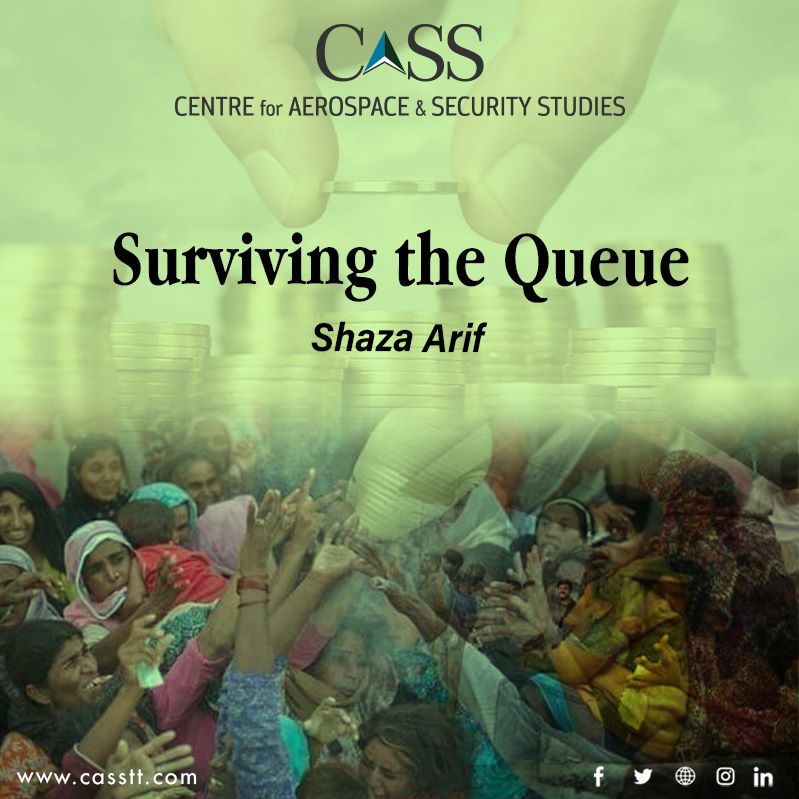Ramadan this year has come at a difficult time for Pakistanis. As the state battles the assaults of political and economic instability, life of an average citizen has not gained the attention it deserves. The removal of subsidies as per the IMF agreement, depreciation of the Pakistani rupee and an inflation of 40 percent, an all-time high in 50 years, has exacerbated the economic plight of the people.
Although the provision of basic necessities has been a long-standing issue in the state, the intensity of the situation has multiplied several fold recently. In fact, the situation has taken such a dangerous turn that citizens’ lives are now at risk owing to the unavailability of basic food commodities such as flour, in a predominantly agricultural country.
The shortage of wheat, surging demands, and the increase in flour prices by 45 percent compared to last year has added considerably to the problems of low-income and middle-class groups who already struggle to make ends meet. Poverty-struck individuals have to endure standing in long queues in scorching heat to get flour from the distribution sites where it is being sold at government subsidized rates or is being given free of cost by local philanthropists. However, several people have lost their lives over the last few weeks in the process. Such tragedies have been happening since the start of the new year. In this holy month alone, 23 people have lost their lives. In most cases, the deaths have been caused due to stampedes at the distribution sites, leaving scores injured as well. The casualties also include women and children which is a testament to how grave the situation has become.
While the government-supported and individual-led initiatives established in various districts for distributing staple supplies ought to help families struggling with the soaring costs of commodities, the situation remains dire. The deaths capture the frustration and sheer helplessness of people who, even after the news of stampedes at various sites, are still willing to risk their lives by waiting for hours in queues under a scorching sun while they are fasting.
It is crucial to consider this issue in the broader context. The current situation is not solely about the availability of a specific food item. Rather, it has the potential to evolve into a significant threat to our national security. In future, if these queues become longer and such instances become more frequent, they can lead to mass social unrest, violent outbursts and deep-rooted resentment, which could escalate to a situation that could undermine the stability and cohesion of the entire state. Furthermore, as essential commodities become more inaccessible, citizens may become more vulnerable to criminal activities and exploitation.
Hence, the issue requires a timely and multifaceted approach both over the short- and long-term. Wheat distribution, both by the government and private networks, needs to be channelised more effectively. Likewise, government initiatives, such as the Ehsaas, have proven to be successful social protection programmes and need to be promoted to help alleviate the financial burden on low-income households. Furthermore, although various initiatives by the government, civil societies and citizens can play positive roles in combating such challenges, the problem also needs a long-term solution.
There is a pressing need to address the underlying economic challenges that exacerbate the issues which are so critical for the common man. Indifference to these developments will only add more fuel to the fire, worsen the existing situation and lead to potentially disastrous consequences.
The current state of affairs in Pakistan has become beyond alarming. The deaths of innocent citizens, as they struggle over a few grains of wheat, is not just tragic, it is also a heartbreaking reminder of the severe poverty and inequality that plagues our state owing to mismanagement, corruption and lack of policy direction. It is a stark reminder of how the most basic human needs can be a matter of life and death for many and how systemic failures can have devastating consequences for those who are already experiencing financial hardships.
No citizen deserves to die the way people have lost their lives in the past few weeks. The translation of Faiz Ahmed’s famous couplet truly encapsulates the current situation:
‘This strained light, this night-bitten dawn
This is not the dawn we waited for so long’
This Ramadan has been a trying time for countless families grappling with the devastating impact of skyrocketing inflation. As the holy month draws to a close, the prospect of Eid looms, but for many, the celebration will be a shadow of its former self. The reality is that these families are not statistics or mere figures on a balance sheet – they may well be our neighbours, our friends, or our colleagues. It is high time that we raise our collective voices against such injustice and force our government to take a compassionate and human-centric approach, one that prioritises the safety, well-being, and prosperity of all citizens, regardless of their social or economic standing. Let us come together and work towards building a society that uplifts the most vulnerable among us and ensures that no one is left behind.
Shaza Arif is a Research Assistant at the Centre for Aerospace & Security Studies (CASS), Islamabad, Pakistan. She can be reached at: cass.thinkers@casstt.com




